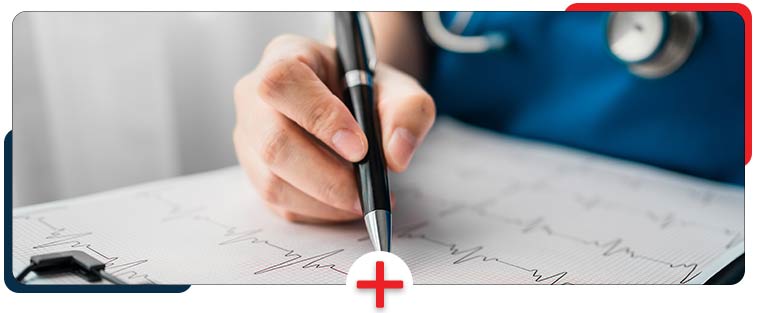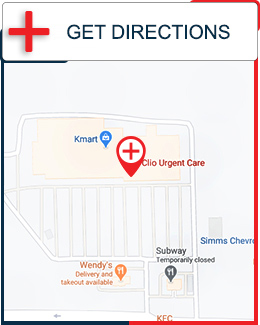What Is an EKG and What Does It Detect?
EKG is a valuable first-line diagnostic tool to promptly detect critical heart issues. However, our team of healthcare professionals take a comprehensive, patient-centered approach, supplementing EKG results with other assessments and tests as needed, ensuring you receive the highest standard of urgent care to protect and support your heart health. For more information, please contact us or simply walk in! You can also schedule your appointment online. We are conveniently located at 4272 W. Vienna Road Clio, MI 48420.


Table of Contents:
How accurate is an EKG in detecting heart issues?
How often should someone get an EKG as part of routine health checks?
What is the difference between an EKG and an echocardiogram?
Can lifestyle factors affect the results of an EKG test?
An electrocardiogram, commonly known as an EKG or ECG, is one of the valuable diagnostic tools we utilize to quickly evaluate the electrical activity of your heart right here in our clinic. Our skilled medical team frequently uses EKGs to detect a range of cardiac conditions, such as arrhythmias, heart attacks, structural abnormalities, and signs of reduced blood flow to the heart muscle.
EKGs are particularly beneficial in urgent care settings because they can promptly identify abnormal heart rhythms, such as atrial fibrillation or ventricular tachycardia, that may require immediate medical attention. Additionally, an EKG performed at Urgent Care can effectively detect acute myocardial infarctions (heart attacks) by revealing characteristic electrical changes, allowing our team to rapidly respond and coordinate further care or timely transfer to specialized cardiac facilities when necessary.
Despite its usefulness, we recognize that an EKG has limitations. Not all heart conditions produce clear electrical abnormalities, especially if symptoms are subtle, intermittent, or in very early stages. For example, mild coronary artery disease or certain structural heart problems involving valves or cardiomyopathies may not always show distinct changes on an EKG alone.
To ensure comprehensive and accurate care, our providers at Clio Urgent Care combine EKG results with thorough patient history, physical examinations, and, when indicated, additional diagnostic testing. Depending on your symptoms and initial findings, we may recommend further evaluations, such as echocardiograms, stress tests, or advanced cardiac imaging, to help rule out or identify conditions that might not be immediately apparent from an EKG alone.
An electrocardiogram (EKG or ECG) is a quick, painless test we perform right here at our clinic to measure the electrical activity of your heart. This test helps our medical team detect abnormalities in heart rhythm, structural issues, or signs of previous heart damage, allowing us to address potential heart problems promptly.
For most healthy adults without known heart disease or significant risk factors, routine EKG screenings aren’t typically necessary during annual check-ups. However, at Clio Urgent Care, we strongly encourage patients over the age of 50 or individuals with risk factors such as family history of heart disease, high blood pressure, diabetes, elevated cholesterol, obesity, or smoking habits to consider periodic EKG screenings. These screenings help us monitor your heart health closely and intervene early if needed.
If you’re experiencing symptoms like chest pain, shortness of breath, dizziness, or heart palpitations, our experienced providers are here for you. We offer immediate assessments, including an EKG evaluation, to accurately diagnose your symptoms and provide timely, effective treatment.
For patients already diagnosed with cardiovascular conditions or who are undergoing treatment, our practice can help you manage your condition with regularly scheduled EKG monitoring. Routine EKGs allow our providers to assess treatment effectiveness, detect any changes promptly, and adjust your care plan accordingly.
An Electrocardiogram (EKG) is a quick, painless, and non-invasive procedure that measures the electrical activity of your heart. During this test, our trained medical professionals will place small electrodes on your chest, arms, and legs to record electrical signals generated by your heart’s rhythm. An EKG is particularly helpful in diagnosing abnormal heart rhythms (arrhythmias), detecting previous or ongoing heart attacks, identifying ischemia (reduced blood flow to heart tissue), and finding signs of heart enlargement. It is often the first test we perform when patients come in with chest pain, palpitations, dizziness, or shortness of breath.
An Echocardiogram is an ultrasound-based imaging test that provides detailed, real-time pictures of your heart’s structure and function. During this procedure, a technician or provider uses a handheld transducer on your chest to send high-frequency sound waves into the heart. These sound waves bounce back to create clear, detailed images of your heart’s chambers, valves, walls, and blood flow. An echocardiogram helps us identify structural issues such as valve problems, congenital heart defects, heart wall thickening or weakening, and impaired pumping ability (ejection fraction). This test is particularly valuable when symptoms or initial tests like an EKG suggest structural or functional issues of the heart.
While both tests assess your heart health, an EKG provides rapid evaluation of your heart’s electrical rhythm and signals, whereas an Echocardiogram provides visual insights into your heart’s physical structures, movement, and blood flow.
At Clio Urgent Care, we understand that your everyday lifestyle choices can significantly influence the accuracy and reliability of your electrocardiogram (EKG or ECG) results. An EKG is a quick, painless diagnostic test we use to assess your heart’s electrical activity and identify potential heart-related issues. However, several daily habits can affect this test.
For example, consuming caffeine, especially in large quantities, can increase your heart rate or cause palpitations, leading to temporary rhythm changes visible on your EKG. Similarly, tobacco use, including smoking or vaping, can elevate your heart rate and blood pressure, potentially resulting in altered EKG findings.
Alcohol intake, even moderate amounts, may also lead to noticeable changes in heart rhythm. Heavy or frequent alcohol consumption can trigger arrhythmias, such as atrial fibrillation or premature heartbeats, clearly detectable on your EKG.
Your physical activity patterns can influence your heart’s structure and rhythm, as regular cardiovascular exercise may lower your resting heart rate or alter heart-muscle thickness. Although these changes are typically healthy, they can appear as variations on an EKG.
Additionally, stress and emotional anxiety can temporarily affect your heart rhythm, causing rapid heartbeats or occasional premature contractions detectable by the test even if you have no underlying heart condition.
At Clio Urgent Care, our goal is to provide you with accurate and reliable diagnostic testing. To achieve this, we recommend that you limit or avoid caffeine, alcohol, tobacco, and certain medications or supplements before your EKG appointment. Openly discussing your lifestyle habits and medication use with our healthcare provider helps ensure accurate readings and supports optimal heart health.
If you have questions or concerns about your EKG test or how lifestyle factors may affect your results, please feel free to speak with our Clio Urgent Care team. We’re here to guide you toward better heart health and overall wellness. For more information, please contact us or simply walk in! You can also schedule your appointment online. We are conveniently located at 4272 W. Vienna Road Clio, MI 48420. We serve patients from Clio MI, Montrose MI, Birch Run MI, Mount Morris MI, Beecher MI, Genesee County, MI, and surrounding areas.





